- Details
- Hits: 1516
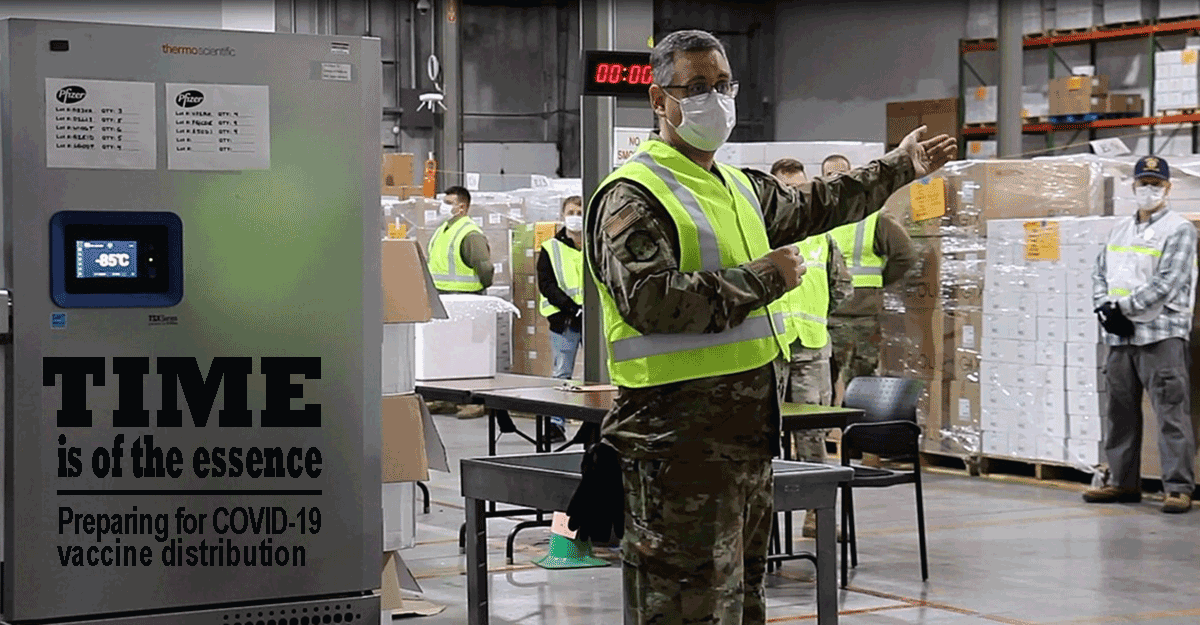 Ohio Air National Guard Senior Master Sgt. Gregory Sprowls explains the process of receiving and repacking COVID-19 vaccines. Sprowls, an air transportation specialist with the 121st Air Refueling Wing in Columbus, Ohio, said his military skills have helped in working with partners from the Ohio Department of Health to develop the logistics plan for the vaccines the state will soon have at its Receive, Store and Stage warehouse. (Photo by Courtesy Ohio Gov. Mike DeWine's office)
Ohio Air National Guard Senior Master Sgt. Gregory Sprowls explains the process of receiving and repacking COVID-19 vaccines. Sprowls, an air transportation specialist with the 121st Air Refueling Wing in Columbus, Ohio, said his military skills have helped in working with partners from the Ohio Department of Health to develop the logistics plan for the vaccines the state will soon have at its Receive, Store and Stage warehouse. (Photo by Courtesy Ohio Gov. Mike DeWine's office)
COLUMBUS, Ohio – Military and civilian partners form an assembly line around tables and carefully work together to safely transfer glass vials into small boxes. Time is of the essence to keep the vials super cold. The vials are empty now and the packaging assembly lines are just for practice, as the Ohio National Guard works with the Ohio Department of Health to prepare for the arrival of a COVID-19 vaccine.
Read more: Ohio Guard partners with state to plan vaccine distribution
- Details
- Hits: 1478
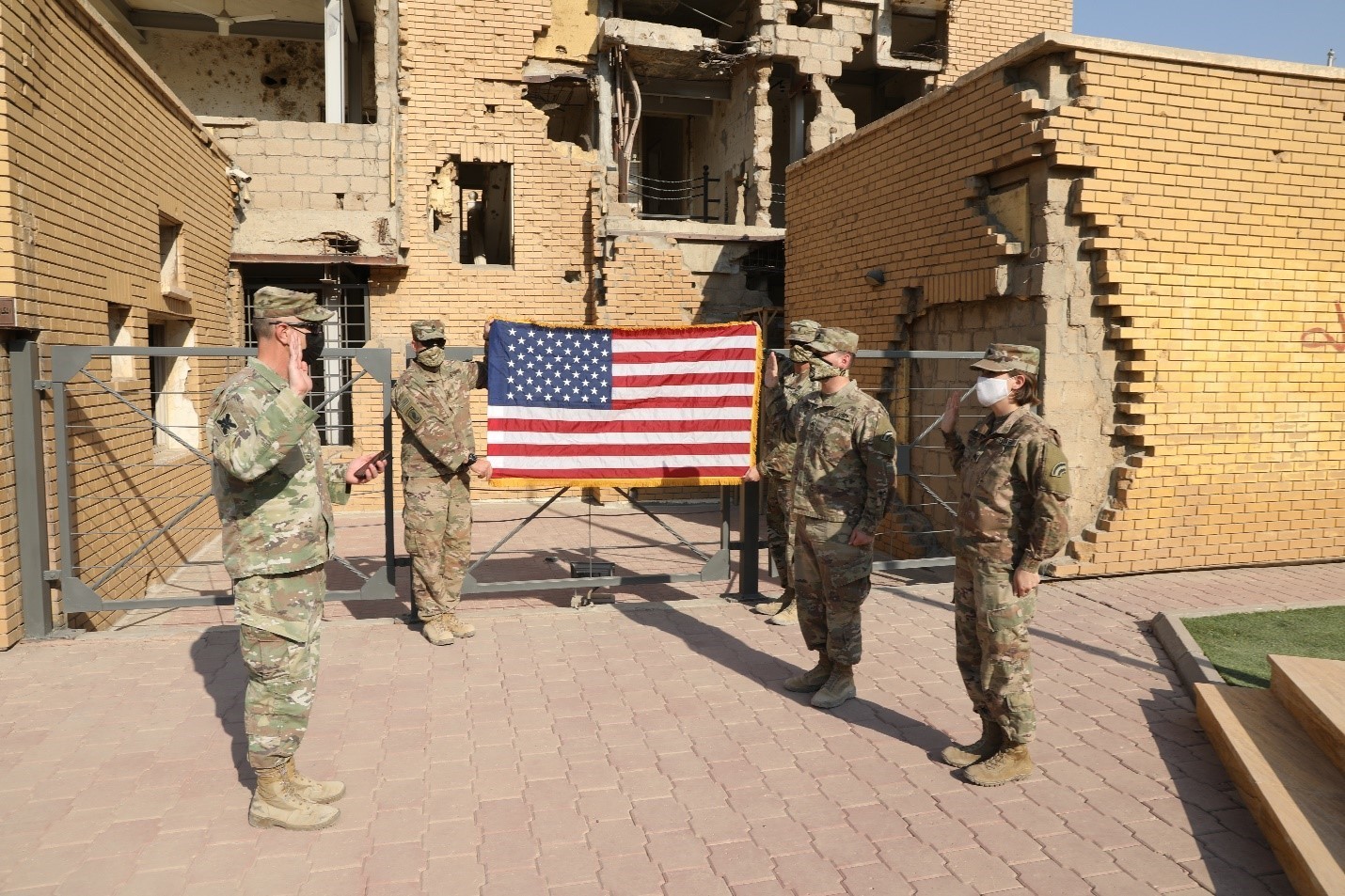 U.S. Army Staff Sgt. A. Jared Forst and Sgt. Becca Meerwarth take their oath of reenlistment Oct. 30, 2020, in Kuwait. The reenlistment was carried out at the Kuwait Martyr’s Museum with Col. Sean Flynn administering the oath. (U.S. Army photo by Sgt. Trevor Cullen)
U.S. Army Staff Sgt. A. Jared Forst and Sgt. Becca Meerwarth take their oath of reenlistment Oct. 30, 2020, in Kuwait. The reenlistment was carried out at the Kuwait Martyr’s Museum with Col. Sean Flynn administering the oath. (U.S. Army photo by Sgt. Trevor Cullen)
ARIFJAN, Kuwait – In front of a host nation's historical landmark, two 42nd Infantry Division Soldiers stand side-by-side, showcasing their devotion to their community, state and nation.
In front of the Kuwait Martyr's Museum, U.S. Army Staff Sgt. A. Jared Forst and U.S. Army Sgt. Becca Meerwarth administered their oath of service as they re-enlisted in the New York Army National Guard while deployed to the Middle East to support Operation Spartan Shield.
- Details
- Hits: 1447
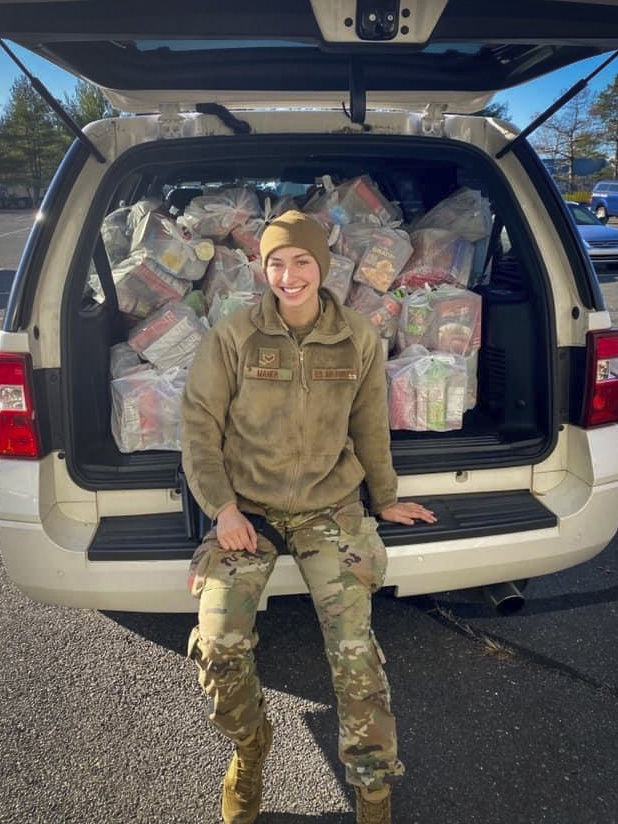 Senior Airman Alexis Maher, 103rd Security Forces Squadron defender, packs a vehicle with Thanksgiving meal kits at Bradley Air National Guard Base in East Granby, Connecticut, Nov. 16, 2020. Maher organized the squadron’s second annual Thanksgiving food drive, in which 103rd Airlift Wing members helped donate a total of 120 family meal kits to food banks in six Connecticut towns.
Senior Airman Alexis Maher, 103rd Security Forces Squadron defender, packs a vehicle with Thanksgiving meal kits at Bradley Air National Guard Base in East Granby, Connecticut, Nov. 16, 2020. Maher organized the squadron’s second annual Thanksgiving food drive, in which 103rd Airlift Wing members helped donate a total of 120 family meal kits to food banks in six Connecticut towns.
(Courtesy photo)
EAST GRANBY, Conn. – As many Americans continue to face health and economic challenges during the COVID-19 pandemic, a Connecticut Air National Guard member is making sure families can enjoy a warm meal this Thanksgiving.
Read more: Connecticut Guardsman organizes Thanksgiving meal donations
- Details
- Hits: 1532
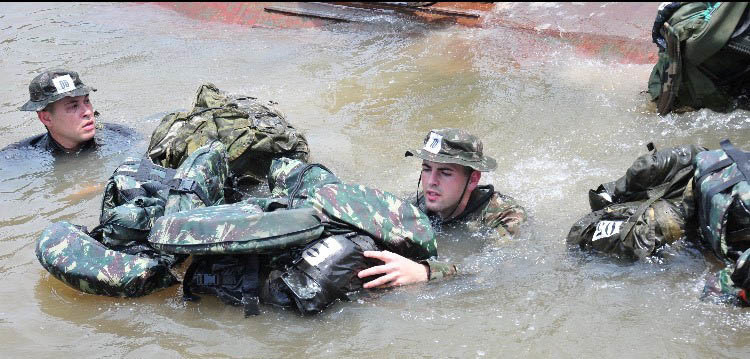 New York Air National Guard Senior Airman Caleb Lapinel trains on tactical swimming in a Brazilian river in October 2020 while attending the international course conducted annually by the Brazil Jungle Warfare Center, known as CIGS for its Portugese initials. Lapinel was the only American in the class of ten.( Courtesy Photo)
New York Air National Guard Senior Airman Caleb Lapinel trains on tactical swimming in a Brazilian river in October 2020 while attending the international course conducted annually by the Brazil Jungle Warfare Center, known as CIGS for its Portugese initials. Lapinel was the only American in the class of ten.( Courtesy Photo)
MANAUS, Brazil – When Senior Airman Caleb Lapinel showed up at Brazil’s Jungle Warfare Training School in September, he met special forces soldiers from Spain, Egypt and Indonesia; paratroopers from Paraguay; amphibious infantrymen from Nigeria, and a Kaibil special operator from Guatemala whose motto is: “ If I advance follow me, if I stop urge me on, if I retreat, kill me.”
“I was worried about that in the beginning,” Lapinel said.
“I said, ‘Wow. I am surrounded by this bunch of paratroopers and special forces; the best of the best from their countries,” he recalled.
He, on the other hand, is an intelligence analyst for the New York Air National Guard’s 109th Airlift Wing, which specializes in flying to Antarctica and Greenland.
He was also at least five years younger than the rest of the class.
Read more: N.Y. Senior Airman graduates from jungle warfare school
- Details
- Hits: 2066
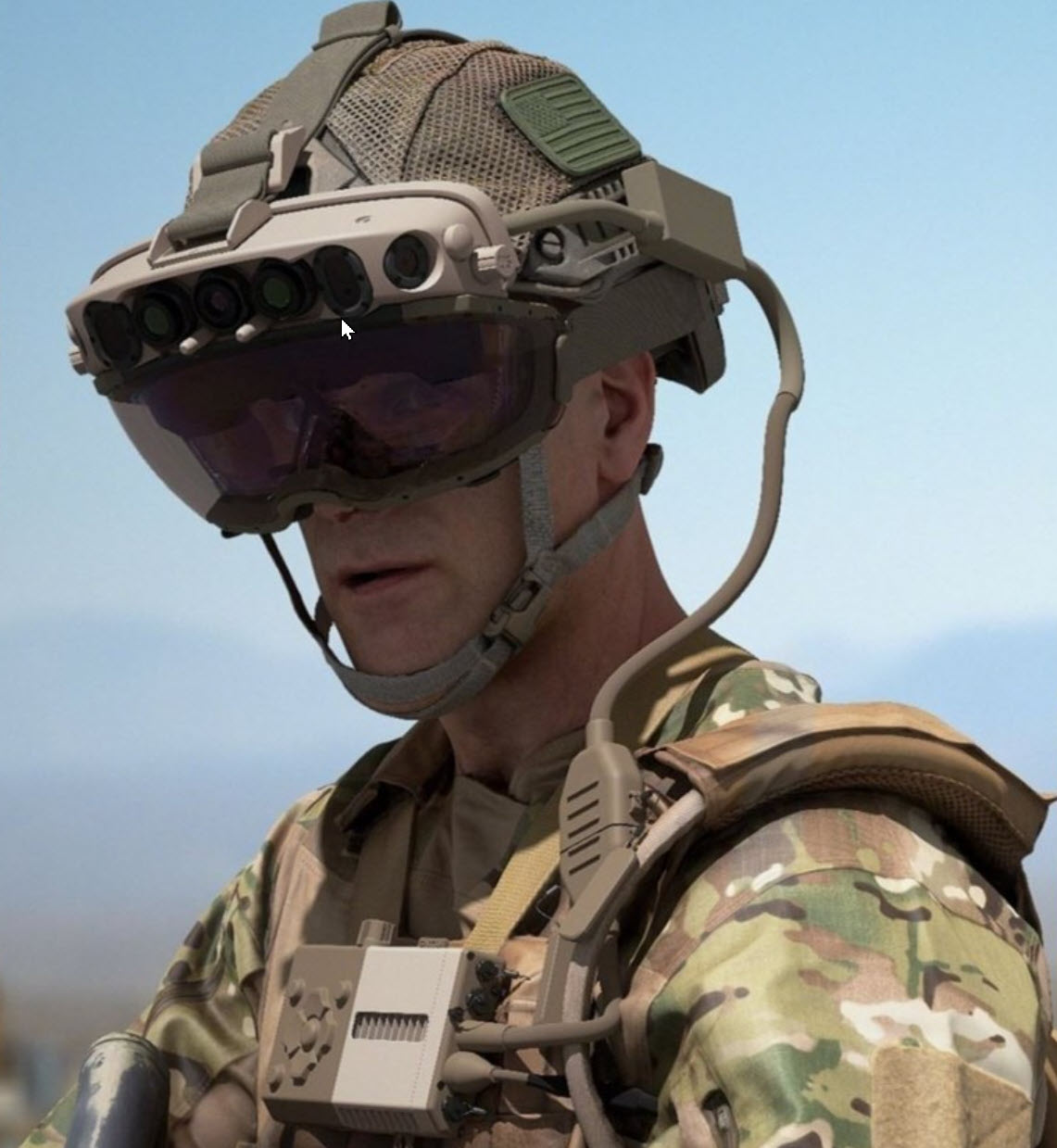 Capability Set 3 (CS 3) military form factor prototype of the Integrated Visual Augmentation System (IVAS). (Courtney Bacon)
Capability Set 3 (CS 3) military form factor prototype of the Integrated Visual Augmentation System (IVAS). (Courtney Bacon)
FORT BENNING, Ga. – The Army-led team of developers creating the Integrated Visual Augmentation System is wrapping up the third major milestone testing and demonstration event this week at Fort Pickett, Va., where Soldiers and Marines have been putting the system, known as IVAS, through a number of field exercises since Oct. 18.
IVAS is designed to enhance the lethality and survivability of the Army’s Close Combat Force through a combination of technologies and augmented reality capabilities delivered in the form of a Heads-Up Display device, much like the famed HoloLens developed by Microsoft, which is, in fact, partnering with the Army to develop and produce the system.
Read more: Army conducts major milestone tests in development of next gen fighting system
- Details
- Hits: 4197
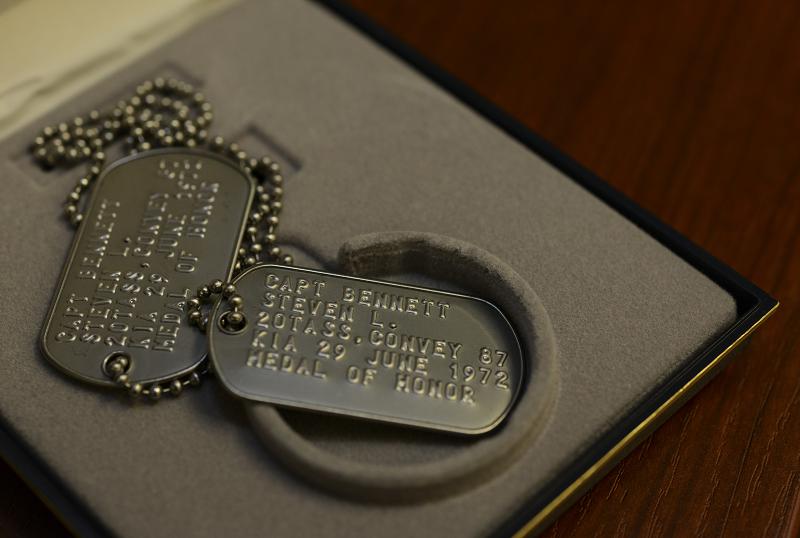 Replica dog tags for Medal of Honor recipient and OV-10 pilot Capt. Steven L. Bennett rest on a workstation at Hurlburt Field, Florida, Aug. 29, 2019. Bennett received the Medal of Honor for heroic actions performed while flying an artillery adjustment mission in Vietnam in June of 1972. Newly printed dog tags were presented to Bennett’s daughter, Angela Bennett-Engele after the original dog tags went missing. (U.S. Air Force photo by Staff Sgt. Lynette M. Rolen)
Replica dog tags for Medal of Honor recipient and OV-10 pilot Capt. Steven L. Bennett rest on a workstation at Hurlburt Field, Florida, Aug. 29, 2019. Bennett received the Medal of Honor for heroic actions performed while flying an artillery adjustment mission in Vietnam in June of 1972. Newly printed dog tags were presented to Bennett’s daughter, Angela Bennett-Engele after the original dog tags went missing. (U.S. Air Force photo by Staff Sgt. Lynette M. Rolen)
We all know what dog tags are — those little oval disks on a chain that service members wear to identify themselves in combat. But have you ever wondered how and when that tradition started, and why they're called dog tags?
We did some research to find the answers.
Read more: Dog Tag History: How the Tradition & Nickname Started
- 404th Paratroopers Conduct Airborne Operations with Focus on Safety
- Who’s at the Helm of Operation Warp Speed?
- DEFENDER-Europe 2020 | Army Prepositioned Stock-2 Enables Dynamic Force Employment in Europe
- Nimitz Strike Group Participates in Cooperative Exercises with Indian Navy
- Pandemic Revealed Supply Chain Vulnerability, Pentagon Official Says
- The 4th: Do our troops fight in vain, because we are destroyed from within?


